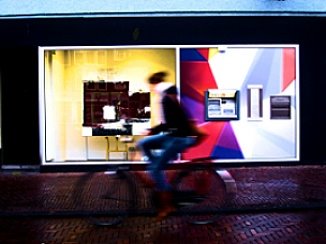Post no 8 Superstate is born, enter the Euro
Apart from communists and extreme nationalists the move towards European unity is backed by most political parties.
Begun by the social democratic and Christian democratic leaders of the Western European states who had fought each other during the Second World War. European unification was a process lead by top political elites.
In most EU countries only a very small percentage of people, around 5 per cent, declared having an exclusive European identity, while up to 50 per cent did not have any sense of European identity.
European political identity was weak and varied. While only still in infancy, this identity had to be cultivated.
But it is a historical fact national identities are also the result of a process of nation-building which in many cases are relatively recent.
The progress towards unity was most often the task of a few dedicated people with a sense of destiny. From Jean Monnet in the 1950s to Jacques Delors in the late 1980s and early 1990s, the journey was anything but easy with some with powerful politicians blocking progress.
In the dawn of the new millennium, SuperState set about to strengthen the frame on which to build this identity. An identity forged together by the traditions of peoples from mixed European groups. “The new European.”
War and the Plastik heaven. Part 1
Theocratic critics of the Western democratic order point to an alarming drift towards lack of compassion, superficial values, self interest, extreme capitalism and the banality of responsibility towards human suffering in the wider world. They see military invasions as a grab for oil to sustain home economic and social standards.
An addiction to carbon resources makes oil the focus for a bigger debate. Is the Plastik heaven making a contribution to climate change. Carbon emissions alarm world leaders. New motor vehicles are produced as the Plastik heaven evolves towards an Electric heaven assisted by Nuclear power. But wiser look to the Sun. They understand its great lure and dream of harnessing a piece off its incredible fusion power to create immortal energy on earth.
“I am saddened that it is politically inconvenient to acknowledge what everyone knows: the Iraq war is largely about oil,” comment by Alan Greenspan of the US Federal Reserve.
Transport, the lifeline for commerce seeks new sources of energy and fuel. Heavy rare earth metals which power the new hi-tech economy becomes a focus for future . In 2010 China controlled ninety-seven percent of world production.

Western Society explores meanings and consequences behind the consumer culture family and the philosophy of the self. As loyalty to personal relationships shrinks dramatically and families re-adjust to new arrangements, a fundamental fabric of Christian teaching finds itself in a desperate struggle to adapt to these rapid changes.
Picasso's great mural is seen as a symbol of horrors and destruction. The painting depicts the fascist aerial bombing of Spanish town Guernica in the afternoon of April 26th, 1937 becoming an iconic protest against the inhumanity of warfare and an embodiment of peace.
On February 5th 2003, during a press conference at the United Nations, a large blue curtain was placed over a renowned tapestry replicating the painting. Some observers suggested it was done so that it would not be visible in the background when military planners from the Atlantic Alliance argued for an attack against Iraq. The attack was to led by an aerial bombardment described as a strike of shock and awe.
In London, February 16th 2003, over a million people marched against the war. It was the largest protest in the country's history. The invasion began thirty-one days later.It led to an insurgency against the Alliance eventually costing a reputed three trillion dollars.
A state off emotional doublethink ......"In the great Holy fight for peace we should give up our civil liberties in the name of freedom. its the right thing to do."
" This crusade, this war on terrorism is going to take a while. It is time for us to win the first war of the 21st century decisively."
Post no 7 DoubleThink
It was about this period in 2001 after the attack on New York and just before the Atlantic Alliance Wars commenced, conspiracy raised its head. Many accusations surfaced towards the hands behind the new Europe project . Illuminati 'defectors” cited warnings of mass control and an imminent financial collapse while “Euro-Sceptics” forebode loss of sovereignty and a diluting of democracy. Asymmetrical Islamist combatants had become of age. A clash of Culture and Civilisation dominated politics. The Internet quickly became the international platform for new citizen journalism and propaganda. Extremism entered the halls of power and influence. Security was paramount. Religious zeal was again a force. Topics once considered debated re-emerged for discussion. “Old Europe” was on the front line. Western parts, according to the gloomy, were to be down graded to level living standards with the East. Communism was to return in a modified form as the preferred system for a globalist society.
Back in Western Europe, Guerlain, in contrast to his earlier realist style of photojournalism, uses abstract to record a society disconnected from anchors to the matters of life and the surrounding world. It is a remarkable period of financial greed and political doublethink.
Extract from an official EU website forum debating the future of Europe November 2009
“But what about tomorrow? We need to define a vision for Europe's future. We need you to be visionary and help us shape the Europe of tomorrow. How do you think the EU should exert its improved capacity for decision-making? Should the EU be more involved on the international scene? Which are the top three measures you think the EU should propose in the short-term? Let's dream up a Europe for the future!” ….........ends
Its a society of the five minute celebrity "Me culture." Euphoria and achievement drives the individual. Collective social harmony is replaced for dynamic innovative individualism. It values the self over the group producing high levels of anxiety while providing a constant threat to the state which lurks everywhere side by side with counter, counter everything.
Doublethink, by George Orwell
"The power of holding two contradictory beliefs in one's mind simultaneously, and accepting both of them....To tell deliberate lies while genuinely believing in them, to forget any fact that has become inconvenient, and then, when it becomes necessary again, to draw it back from oblivion for just so long as it is needed, to deny the existence of objective reality and all the while to take account of the reality which one denies — all this is indispensably necessary. Even in using the word doublethink it is necessary to exercise doublethink. For by using the word one admits that one is tampering with reality; by a fresh act of doublethink one erases this knowledge; and so on indefinitely, with the lie always one leap ahead of the truth."
The Conspiracy Behind The European Union: What Every Christian Should Know: .....”Developments in Europe are not planned to end with merely economic and political union. The envisaged European Superstate plans to go even further. Although – as is characteristic of the planners' tactics – no formal mention of the next step has yet been made or foreshadowed in any treaty, it is clear that the stage has been set, and is already well constructed, for the greatest politico-religious revolution ever witnessed in the history of mankind.”...Professor Arthur Noble Nov.7, 1998.
"We are grateful to the Washington Post, The New York Times, Time Magazine and other great publications whose directors have attended our meetings and respected their promises of discretion for almost forty years. It would have been impossible for us to develop our plan for the world if we had been subjected to the lights of publicity during those years. But, the world is now more sophisticated and prepared to march towards a world government. The supranational sovereignty of an intellectual elite and world bankers is surely preferable to the national auto-determination practised in past centuries."
David Rockefeller Baden-Baden, Germany 1991
Post no 6 Post Communism in Romania
The sever winter Siberian wind sweeping down east of the Carpathian Alps to chill the Wallachian plain is named `Crivati.` Bucharest, the Romanian capital, stands squarely in its path. This cold blast heralds in hungry months with ample falls of snow and ice. But in 1989 it stayed away allowing enough warmth to make a revolution.
 |
| After the December 1989 overthrow of the dictator Ceausescu, the country was already 50% into its national food reserves |
Genuine hardship almost crushed Romania in the years following the collapse of Communism in 1990. Piata Amzi, the central market in Bucharest, had little to offer its citizens in the way of choice. During the early part of the decade people embraced Christianity, tradition and a heart felt thank you to martyrs of their Revolution. They sought solace in a collective rebirth against the despair and meaninglessness nihilist legacy of communist social and political constraint. Eastern Europe had been a vast open prison with a view of western freedom. Guerlain found it remarkable that Radio stations in 1990 began to play western music starting from the 1950's as if to play catch-up while providing an education in past popular European culture.
During these final years of the Soviet Union internal political landscapes changed. Ethnic tensions and fear of discrimination gave rise to separatist sentiments in the Soviet Republic of Moldova. Appeals were made on Russian television for fighters to go to Transdinistria to support the Separatists’ cause.
Guerlain went to Kishinev, contacted the agency reporter and arranged to go the following day to see Cossack combatants. Kitted out in full protection armour, Guerlain sat in the back of a Volga limousine with Natasha up front dressed in a bright blue maxi coat, traditional fur hat, muff and elegant shoes. She had arranged to go to the Opera later that evening. As they approached the separatist capitol Tiraspol via a secondary road, Cossacks appeared over the brow of a hill and while running towards the car one soldier cocked the lever on his AK47. Fear gripped Guerlain. The driver braked immediately so he could raise his hands. The ensuing eye contact with the approaching gunman was nerve shattering. Natasha calmly lowered her window, said something in Russian to which the Cossack in question froze, saluted, then waved her by. Natasha was one of their very best in the still functioning KGB.
Fast moving events gripped Europe. The Maastricht Treaty gave birth to The European Union. It widened its reach towards the East becoming fifteen and an ideology which followed the tradition of Richard Coudenhove-Kalergi's Pan Europa proclamation in 15 November 1922. His vision of a Europe united in freedom, justice and peace was the signal for this great political movement. But even then he saw dark clouds of War filling the sky. Eventually Coudenhove predicted catastrophe and foresaw a Europe divided by an artificial border (Berlin Wall) between a Soviet satellite colony and an American dominated protectorate.
Post Communism was the period of Euro pluralism, multi culturalism and diversity. Enjoying life's variety is a card for richer experiences in any part of the world as Guerlain discovered from his time spent in the Carpathian Alps enjoying wonderful comparisons and contrasts with his home.
Hotel “Roman Emperor” in the Saxon city Sibiu, Transylvania, was a great favourite of the Dictators son. The restaurant dance floor was alive to the melody of soft traditional music lifting Guerlain's spirits to dreamy feelings of well being. In a casual moment, to release smoke and refresh the air, a large stained glass in the roof was manually hauled open, permitting formations of floating snow flakes to gently enter the room and join people below. The generosity of local peasant tradition and simplicity drew Guerlain to spend many years exploring the culture of the Carpathian Alps.
Some time later as the century drew to a close, a total eclipse of the sun made a show of support in Bucharest to rekindle spirits and life became somewhat pleasant in the parks and terraces as people waited. Parties came back to the city once fabled as the “Paris of the East.” A new generation appeared amidst leafy boulevards and there was new glitter in the glimmer as hope turned to expectation. Romanian people lay faith in the belief the Occident could help the country restructure to eventually join the new plan for Europe.
Although a difficult decade, post Communist Romania toughed it out. It prevailed, entered the new millennium out of darkness and into the making of the Lisbon Treaty, Superstate and the War on Terror.
Post no 5 A Balkan Tale: Cruel divorce ends Tito's Superstate
His days in Yugoslavia during the summer of 1992 were dangerous....He had driven from Bucharest across the Wallachian plain over the Danube into Serbia and on to Belgrade. The following morning he continued on. An agency colleague, with whom he had just made a first acquaintance enquired how he expected to make his way overland though Bosnia Herzegovina to Sarajevo armed with nothing more than a passport. Guerlain looked at him and asked, “Any ideas?” Branko passed a piece of paper, a photocopied map of the area he would be traversing and advised him, “If stopped by Serbs, say it was given to me by a friend in Belgrade.”
Following instructions to keep on the move, his journey went smoothly, but detours and traffic congestion from the displaced Muslim population cut into the time. At Han Pijesak, not far from his destination, he decided to stop for the night, entered an hotel on the village main street and walked into the company of a notorious front line militia.
 |
| July 22, 1993 witnessed 3,777 shell impacts. An estimated 10,000 civilians died in the longest seige in modern warfare. |
These were men of a kind who were present there for actions of extreme negativity. Dry sallow faces conveyed their story of horror and chilling fear. Guerlain approached the front desk, spoke in English and was immediately rebuked by the owner for entering the hotel. He showed Guerlian to the door, across the road and to the police who took him into the safety of their station. An act of charity greatly appreciated forever. Guerlain handed the police his passport, the map, repeated the sentence he was told to say and in return was given a bed for the night. “Your friend did you a service” remarked the policeman the following morning handing back the documents. Why don't you come with our forces to Sarajevo.” Guerlain declined the offer, thanked the officer for his assistance and left. Like the rest of Europe he was shocked at the terrible consequences behind the meaning of the three words written down on that precious paper which simply said “Srebrenica I Srbija.”
Snajperska aleja (sniper alley) was the main boulevard leading out of Sarajevo towards the airport. The surrounding hills were lined with Serb positions and it posed a real danger to those venturing anywhere near it. An arsenal of high powered rifles, mortar shells and tank rounds, along with 135mm artillery greeted any of its visitors. Signs reading "Pazi – Snajper!" “Watch out – Sniper!” were everywhere.
It was not uncommon for media personnel to make frequent runs in the alley using only wits and whatever available protection they could muster to dodge incoming fire. By summer’s end amongst some, the alley had become a place of excitement and dare. On occasions, drivers were measured by their ability to read the minds of the snipers as they slowed down, sped up, hugged the buildings, switched lanes, or abandoned the mission.
On such a joyride Daniel Guerlain looking out of the back window laughed mockingly with his friends at the incompetence of the mortar fire. Shelling was being stepped up along the alley but only some seconds too slow in making contact with their car. Gambling with such odds was foolhardy. Snipers have only to be lucky once. Interviewing such a rifle sniper on the hills in Serb held Grbavica, the battled hardened man in his thirties remarked, “It is not so simple to get a victim but you learn the more you do it. Women with children are the easiest, but remember, shoot the child first as the mother will try to save her own.”
Post no 4 War Years: part 1, A Levant journey
Post Communism during the 1990's saw the former Warsaw Pact military block descended into uncertainty and severe financial hardship. Balkan Europe was in the grip of a violent crisis. This was old fashioned warfare. As the longest siege of a capital city in modern history, the attack on Sarajevo drew parallels with World War Two.
New conflicts in the Levant and the near East produced carnage and wretched misery, the asymmetrical combatant was evolving into a deadly opponent, challenging the authority and ambitions of Western power. Jerusalem was again becoming the focus of a clash between culture and religion.
 |
Israeli Jews walk towards the Jaffa Gate in West Jerusalem 1990, Palestinians conduct Friday prayers at the Damascus Gate in East Jeruslaem |
By previous standards the war in the Gulf had been a short one. Guerlain had met Lou Salome, a Philadelphia inquirer special reporter in a Damascus hotel. “Lets go to Kurdistan” Lou said and after some deliberation on whether Beirut provided a better destination Guerlain opted for the desert trip. On route to enter northern Iraq, the road passes the Palmyra oasis, a glorious sight to witness amongst the empty sands. They gazed down its long pillared avenues with pride and respect. It was also sad that such a great treasure can crumble slowly into eventual dust. It reached out for all to admire its collective human spirit, wanting to live forever.
They met a fighting politician at Kamishli who would some years later become a president in Iraq and who assured their safety in his beloved Kurdistan. As they crossed the mighty swollen Tigris river, from the small boat he could see rows and rows of Iraqi prisoners being led away into fading light.
 |
| Kurdistan 1991 |
 |
| Kurdistan 1991 |
Daniel Guerlain was unconvinced the matter in Israel would be settled soon. In fact for him the current matter after years of strife in the land was indeed the settlement of land. His own province at the far end of Europe was just beginning to recover from settlement matters and it seemed some didn't wish to properly address this thorny subject.
“There is a line these Arabs know not to cross” he and a German colleague were told by a fellow journalist while driving to visit a Jewish Hebron settlement. “Arabs are not worried” he had been told some months previously by an Egyptian history professor in Bahrain. “In one spectacular moment the people will rise up together and take back what is theirs.”
On leaving Jerusalem in 1991, it was clear there would be ample time to return to check out its journey towards asymmetrical combat wars. Eventually the Jewish people feeling fear sought to find safety and surety behind high walls.
post no 3 Novembering Berlin:
“In politics, nothing happens by accident. If it happens, you can bet it was planned that way,”……….President Roosevelt.
It had not been an accident Guerlain was in Berlin that frosty Autumn week. Political and social pressure had been building up along the East German border for weeks.
It had not been an accident Guerlain was in Berlin that frosty Autumn week. Political and social pressure had been building up along the East German border for weeks.
Officially referred to as the “Anti-fascist protection wall” by the East German GDR and the “The Wall of Shame” by Western authorities, the Berlin Wall was the greatest symbol of the Cold War and the ideological conflicts of the 20th century. Stretching over 140 kilometres.
it was reinforced by mesh fencing, signal fencing, anti-vehicle trenches, barbed wire, dogs on long lines, beds of nails under balconies hanging over the death strip, one hundred and sixteen watchtowers and twenty bunkers.
 |
| Around 5,000 people successfully defected to West Berlin, some hundreds died attempting. |
Leaving the splendid comfort of the Grand hotel in East Berlin's Friedrichstrasse, Guerlain made his way north east by tram towards Prenzlauer Berg district. The streets were filling with people. The cold morning had an electrifying atmosphere filled with a sense of great importance. Berlin again was at the centre of world attention. The Cold War was at an end.
He heard little criticism about the unfolding event, the reaction being mainly positive, but nevertheless was told by a young Jewish man, "These walls were put here for a reason.” The memory of the holocaust still haunts the world and to enshrine its preservation, Berlin later erected a memorial in the centre of the city close to where Adolf Hitler's war bunker was located. He met an American youth who asked if he could walk with him to converse and speculate on the future. So together they continued along the wall from Prenzlauer Berg to Unter den Linden where they witnessed the last goose step of the GDR army. They saw people writing statements on the Wall near Brandenburg Tor while pasing onwards towards Treptower Park on the river Spree.
The park, was a tourist attraction for USSR citizens. Its most prominent feature, the Soviet War Memorial, built to the design of the Soviet architect Yakov Belopolsky, commemorates 20,000 Soviet fallen soldiers for the Battle of Berlin during the closing hours of their “Great Patriotic War.”
 |
| Sights around the Berlin Wall in the final days of the GDR. |
It was a moment of immense expectation, compromise and friendliness. Everyone was human and ordinary again. In the streets people smiled, cried and judged the past with talk of new this and new that.
At a small inconspicuous café bar, bare of trappings or comfort, they ordered wine and were offered a bottle of the stuff for next to nothing. From over Guerlain's shoulder, they heard a soft snigger. Sitting alone, a not so elderly man with his hard life etched on his face pleasantly looked on.Sipping from small tulip glasses, the wine after a few minutes created a strong feeling of intoxication. They examined the label revealing the motive for the man's reaction. At an uncanny seventeen percent proof, it would be improbable any more wine could be consumed. With a smile Guerlain passed over the remainder for the local to enjoy and paid up.
 |
| The end of divison in Germany |
post no 2 Europe's Dark Legacy: Working to a plan, Western leaders struggled to moved Europe forward from a broken divided continent in 1945 towards a new State of peace and unity. If the fall of the Berlin Wall on November 9th 1989 marked the end of the Cold War and the beginning of a new history then November 19th 2009 became that history when Europe got its first appointed presidential figurehead. The formation of Superstate from the ashes of the second world war evoked a surge of passion, enthusiasm, hope, suspicion, conspiracy, euphoria and resentment at the speed of change. The creation of such an empirical entity was one of the swiftest in history.
 |
| Auschwitz: Europe's dark legacy moved hearts and minds towards unity Move mouse over picture, click to enlarge. |
From the ashes of devastation across the land and under the leadership of “Old Europe,” the Schumann declaration in 1953 set sail the mission to claim the reins of reconstruction. A Europe to end internal wars, a Europe with a strong voice at the international table, culturally and linguistically diverse but with common languages of communication, a Europe wealthy in mobility, commerce and living standards and a Europe with a shared identity and common destiny.
Europe in 1973 was a continent divided both physically and ideologically. The Cold War was producing an alarming nuclear arsenal. Proxy wars raged in Asia, Middle East, Central and Southern America. Western social and political movements challenged established orders. Dictatorship, Communism, Religion, Liberalism, Nationalism, Conservatism were topical issues during this epoch.
This is a story about the evolution of European ambitions to become a democratic Superstate. It is not a chronology on news but a reflective narrative, a flash report for a future generation building European identity and dimension. It is a document in pictures with words reporting selected characteristics, events, people and culture. It describes social & political topics of this time, as seen by professional observer Mr. Daniel T. Guerlain,.
In Europe his journey was often troublesome, as for most of his early life Guerlain was constantly recording community suffering and tragedy.
Born into a long time troubled peripheral part of Europe, Daniel Guerlain concentrated his initial interests in recording the social & political history dominating life there. It was a challenged society struggling to overcome the complications of its past. As part of a wealthy democratic Kingdom the province was better off than other regions in managing the functionality of daily life while engaging violent outburst of grievances and mistrust. In Belfast, a former industrialised city, decaying grandeur and its social structures aggravated a reoccurring conflict situation. He recorded these times, and the days ahead incorporating the communication means of photography.
It was the year however, the Kingdom and Ireland did something together,.....they voted yes to joining the EEC, an economic community and forerunner to the new Union Superstate. On joining the media corps, it was also the first and last time Mr. Daniel T. Guerlain, exercised his right to vote.
Post no 1 Preface
In the hotel Leopold at the heart of bureaucratic Brussels, Mr. Guerlain wrote his final words over lunch to a lecture he would soon present to a class of international students. The words, “Every beginning is difficult,” seemed a strange choice to end a speech, but not so strange, when one realises Guerlain was referring to a new beginning, the beginning of a new Superstate. Fashioned out of 27 war hardened countries, it was an ambitious project. Most observers agreed it needed an ocean of effort and co-operative unity to become a reality and, that such an achievement would be unique in modern European history.
Guerlain, a photojournalist and Documentist, had compiled a visual narrative from all his journeys since the UK and Ireland joined the EEC in 1973 till the present day. He had advertised his new product on the Internet as an informed lecture with accompanying book using the pitch, “People can appreciate the benefits of progress if they know better the past they are coming from.” Consequently, he was awarded an educational project addressing a visiting student group about how Europe is becoming one big peculiar political mix.
He would describe landmark moments, in the form of snippets of personal stories, illustrated by his many pictures. These would be his view of the stepping stones towards Superstate and the goal for a tolerant, diverse, cultural Europe. In this way he hoped to get the historical background across while also telling these new Euro citizens a little about himself and the world he grew up in.
Guerlain stared across the dining room holding his book titled “Dimension, the Art of Superstate”, containing the little yarns, captions and body of images. He knew he had a job on hand to clarify its message to a mixed youth with little historical memory. It might possibly be no more than an English language session around a topic of history beyond the audience’s present focus. This was a problem for him. He really needed to appeal to sponsors or his narratives would not get funded, retreat underexposed into the shadows to be filed away in some darkened room. With less than two hours to wait, he opened his book and read.












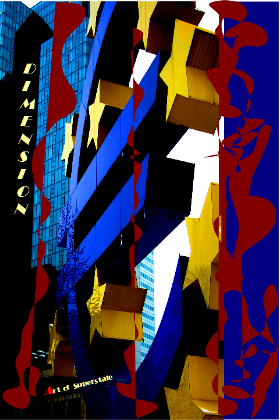
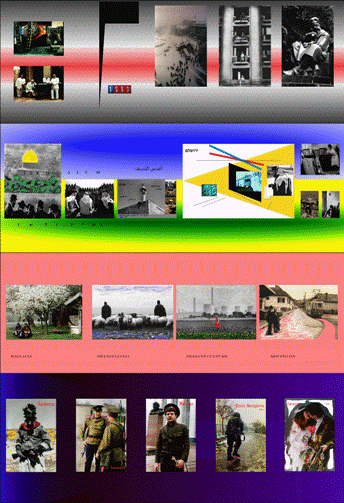
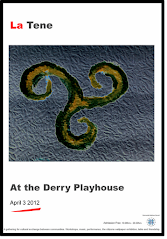










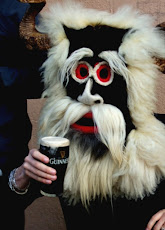

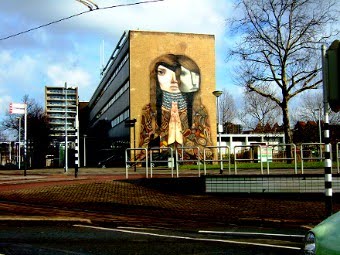
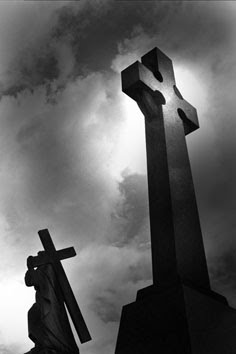

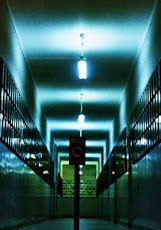.jpg)

